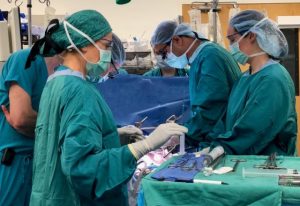Three years after performing its first case, the program, created and led by Chirag Desai, MD, FACS, has performed its 50th case, making UNC one of the most significant centers for surgical therapy for this disease.
The article first appeared in healthcare news on February 19, 2021.
The UNC Chronic Pancreatitis and Autologous Islet Cell Transplant Program was established and initiated in mid-2017 by Chirag S. Desai, MD, FACS, professor of Surgery and Surgical Director of the Liver Transplant Program. The goal of the program is to provide comprehensive surgical care to patients suffering from chronic and recurrent acute pancreatitis of several etiologies.

The program offers pancreatic surgery as well total pancreatectomy and autologous islet cell transplant (TPAIT). In TPAIT, the whole pancreas is surgically removed and then sent to a UNC Lineberger Advanced Cellular Therapeutics (ACT) Facility and is manufactured under current Good Manufacturing/ Tissue Practices (cGMP/cGTP). From there, enzymatic digestion of the pancreas is carried out to separate insulin and glucagon-producing islet cells from the rest of the diseased gland. These islet cells are brought back to the operating room and transplanted into the patient’s liver via infusion through a portal vein. This helps patients produce insulin without the pancreas and prevents brittle diabetes. This is the only program of its kind in North Carolina and one of just a handful across the U.S.
The program’s first case was performed in Chapel Hill in the fall of 2017. This month, the program celebrated a new milestone. After evaluating nearly 190 patients of chronic pancreatitis for potential surgical therapy, last week a surgical team performed the program’s 50th case (30 parenchymal preserving CP surgeries and 20 autologous islet cell transplants), which makes UNC one of the most significant centers for surgical therapy for this disease. The program has had very good outcomes and has resulted in several publications and research projects as well. Desai and other program members hope to continue this work and expand their capabilities to help even more patients achieve a better quality of life.
